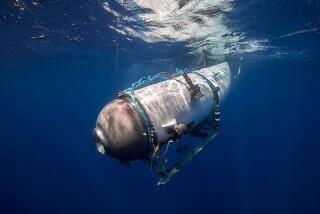Sub Captain Says Civilians Hindered Crew
- Share via
The captain of the U.S. submarine that collided with a Japanese fishing trawler has changed his mind on the politically sensitive issue of whether the presence of civilians on the sub contributed to the deadly crash.
Cmdr. Scott Waddle, after constantly reviewing details of the Feb. 9 collision, now believes the presence of 16 civilians in the crowded control room broke the crew’s concentration at a critical time, said Waddle’s attorney, Charles Gittins.
The crash occurred when Waddle and his crew failed to detect the trawler nearing the sub’s position.
At the court of inquiry into the tragedy, Waddle was asked by two admirals if the civilians were a factor. Twice he answered, “No, sir.”
The submarine Greeneville smashed into the Ehime Maru off Hawaii during a rapid surfacing maneuver done to impress the civilians. Nine people on the trawler died.
The issue of the civilians, who were aboard the sub as part of the Navy’s Distinguished Visitors public relations program, could figure prominently in the event of a court martial and prove an embarrassment for the Navy. The program is supported by Navy brass as a way to influence public opinion and help the Navy win funding from Congress.
Adm. Thomas Fargo, commander of the Pacific Fleet, is reviewing the 2,000-page report submitted Friday by the court of inquiry, to decide what, if any, punishment should be meted out to Waddle and other crew members.
According to Gittins, Waddle is worried that he will face a court martial, which could mean a prison sentence if convicted and loss of pension for 20 years’ service.
The admiral who did the initial investigation accused Waddle and his crew of numerous mistakes but said their actions did not merit criminal charges. This weekend, news media in Japan and the U.S. cited sources saying the court has not recommended a court martial.
Although exhaustive in other regards, the 12-day court was limited in its review of the civilians and the public relations program.
A sonar analyst told National Transportation Safety Board investigators that the civilians’ presence blocked him from getting information to the captain that might have averted the crash.
At the court of inquiry, however, Petty Officer 1st Class Patrick Thomas Seacrest testified he was not hindered by the civilians. He was not asked to explain his earlier assertion.
None of the civilians was called to testify nor was the retired admiral who arranged for them to be aboard the Greeneville.
During his summation to the court of inquiry, Gittins indicated he plans to ask about the public relations program if his client is ordered to a court martial.
Testimony showed the Greeneville was ordered to sea Feb. 9 solely to provide the civilian VIPs with a show, a violation of Navy rules.
More to Read
Sign up for Essential California
The most important California stories and recommendations in your inbox every morning.
You may occasionally receive promotional content from the Los Angeles Times.












